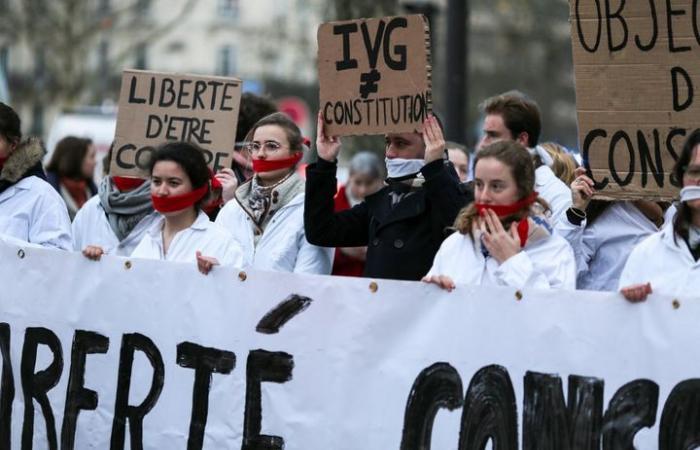On January 17, 1975, the law authorizing the voluntary termination of pregnancy was promulgated in France. Half a century later, and despite an extensive legislative arsenal, women wishing to have an abortion still face a lack of willing doctors, medical structures or external pressure.
Salomé* keeps a memory stinging from her abortion. In 2021, this teacher makes an appointment with a midwife for a voluntary termination of pregnancy (IVG). The forty-year-old is then very curtly received by the practitioner. “She told me that she didn’t understand how I could have accidentally gotten pregnant given my level of education, and that she was not a distributor of abortion pills”remembers Salomé. Despite often feeling guilty about medical treatment throughout her journey, the Parisian nevertheless ended up having an abortion. But concludes that he “there is a huge gap between the right to abortion, now guaranteed by the Constitution, and the reality of this kind of humiliation.”
Five decades after the promulgation, on January 17, 1975, of the Veil law decriminalizing abortion in France, 243,623 abortions were carried out in 2023, or 8,600 more than in 2022, notes the Directorate of Research and Studies , evaluation and statistics (Drees). In fifty years, women have seen the right to abortion expand,extension of the appeal period (from 10 to 12 weeks of pregnancy in 2001, then up to 14 weeks in 2022) and the elimination of the seven-day reflection period in 2016. However, more than eight out of 10 women (82% ) who have had an abortion still report the existence of obstacles, according to an Ifop barometer for Family Planning published at the end of September. Like Salomé,Dozens of women responded to the call for testimonies launched by franceinfo to recount the obstacles they have encountered in recent years.
After discovering an unplanned pregnancy, the first difficulty described by women is finding clear information about abortion. Despite the extension, in 2017, of the offense of obstructing information on abortion to websites, groups opposed to abortion continue to influence women seeking information online. “I was lost before my abortion, I needed to talk with other women who had experienced the same situation”relates Nina, a thirty-year-old who became pregnant in 2023.
“I went to a Facebook group that seemed open to discussion and support… In the end, I was called a 'murderer' after making the decision not to keep the baby.”
Nina, thirty-year-old who had an abortion in 2023at franceinfo
While the Veil law theoretically guarantees freedom of choice, many women describe attempts to interfere in their decision, in favor or against abortion. First a student, then a young mother, Aurélie underwent two abortions “under pressure” of his father and his partner. For her part, Lucile* says that the “first two doctors” met with a view to an abortion have “definitely tempted to [la] discourage abortion.” “I came out crying and feeling guilty, in addition to having wasted precious time”, she adds.
Her experience highlights another recurring difficulty: finding a practitioner who performs abortion, within the legal time limit of 14 weeks of pregnancy provided for by law. In addition to the conscience clause which concerns all doctors(New window), l’article L2212-8(New window) of the Public Health Code provides that“uA doctor is never required to perform a voluntary termination of pregnancy.. More “the main explanation for the difficulties in accessing abortion essentially results from disinterest in a medical procedure that is little valued and considered to be of little value”points out a 2020 parliamentary report.
“The burden of effectively maintaining the right [à l’IVG] relies essentially on a handful of activist practitioners, many of whom will soon find themselves retired.”
PS deputies Marie-Noëlle Battistel and LREM Cécile Muschottiin a parliamentary report in 2020
While medical abortion can be carried out in a city practice since 2001, only 3,170 self-employed professionals have performed it at least once in 2023, according to the Drees. That is 14% of midwives, 19% of gynecologists and 1.5% of general practitioners. “I contacted eight or nine professionals before calling Planned Parenthood, who provided me with a list of available doctors”recalls Adeline, who had an abortion in 2017.
This lack of volunteer doctors adds to the lack of infrastructure. Some 130 abortion centers have been closed over the last 15 years, reports Family Planning. In 2019, theThe average time for a first appointment with a health professional for an abortion was 7.4 days, according to the Ministry of Health, compared to five days recommended by the High Authority of Health (PDF). Depending on the region, this average delay could nevertheless vary from 3 to 11 days.
-But the handling time can sometimes be much longer. In 2017, Anna, who found out she was pregnant “between one week and 15 days after the start of the pregnancy” was thus unable to abort “only a few days before the legal deadline”due to lack of an appointment available earlier. To meet this deadline, some patients are also forced to travel several dozen, or even hundreds, of kilometers from home. In 2018, Julie agreed to make an appointment 70 km from her village in the Hautes-Pyrénées to have rapid access to an abortion.
Every year, “between 3,000 and 5,000 women” travel abroad because they learned of their pregnancy too late or were unable to find an appointment in time, points out the 2020 parliamentary report. But this trip costs several hundred, sometimes even thousands of euros, and presents “multiple practical difficulties” (find a childcare solution, obtain proof of absence for the employer, etc.).
If the Ministry of Health recognized in 2019 “areas of tension” local authorities to access abortion, he considered that there were no “white areas” and that the majority of difficulties were “punctual”. In 2023, some eight out of ten abortions took place within the department of the women concerned, underlines the Drees. For some women, the delay in treatment nevertheless means they cannot choose the method used, with surgical abortion being compulsory from the 8th week of pregnancy.
“Territorial inequalities [d’accès à l’IVG] inevitably lead to social inequalities, the most vulnerable women (modest incomes, minors, etc.) and even more so those who find themselves in precarious situations (homeless people, migrant women, disabled people, victims of domestic violence, etc.) encountering the greatest difficulties”point out deputies Marie-Noëlle Battistel and Cécile Muschotti in their report.
Among the additional obstacles for these populations, Marie Missioux, sexual and reproductive rights and health referent at Médecins du Monde, cites “the lack of information adapted to vulnerable people, who do not always know that abortion is authorized in France”. But also their geographical distance from urban centers, “the language barrier” for allophone women, interpreters are not always available in health establishments, or a prohibitive financial cost. If abortion is in theory 100% covered by health insurance, without advance costs, since 2016, patients sometimes have to dip into their wallets in the event of excess fees in the private sector. So in 2020, Zoé*, then a student, had to borrow around 300 euros from her roommate to pay for her abortion.
“Fifty years after the Veil law, we see that there still exists a gigantic taboo on abortion”also reports Sarah Durocher, president of Family Planning. Among the women who told the story of their abortion to franceinfo, many did not speak about it to those around them. “I didn’t tell my mother-in-law that I had an abortion. I felt that it was unaffordable, she wouldn’t have understood”says Julie, who had an abortion in 2018, when she already had two children. “I felt, and still feel, ashamed, adds Salomé. Few relatives know about it.”It was an extremely lonely experience.”also blurts out Adeline.
Pour “stop stigmatizing abortion compared to other medical procedures”Family Planning demands, among other things, “the abolition of the specific conscience clause on abortion”explains Sarah Durocher. The latter also wants the organization of a new national campaign on abortion and contraception, while the last one dates from 2015 (PDF). And hopes that the 50th anniversary of the promulgation of the Veil law will, in the wake of the #MeToo movement, be an opportunity to say “I had an abortion too.”
* First names have been changed at the request of those interviewed.
__________________________________________________________________________________
Do you have a question about voluntary termination of pregnancy? An anonymous and free national number, 0800 08 11 11, is at your disposal. You can also consult the official website ivg.gouv.fr.







